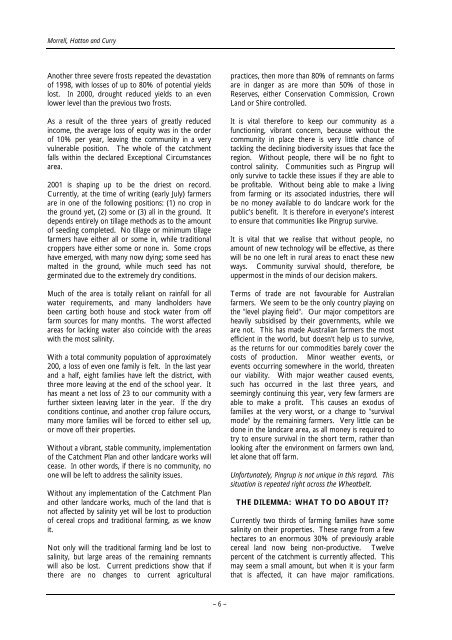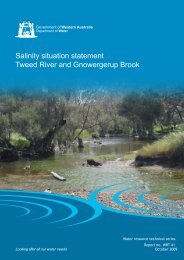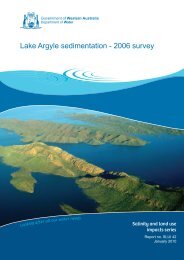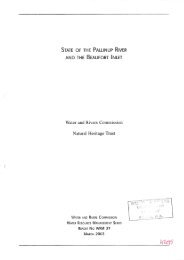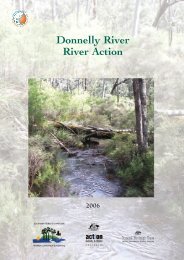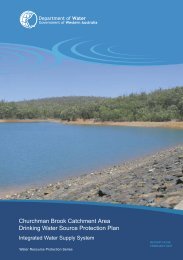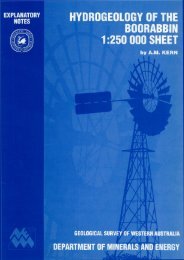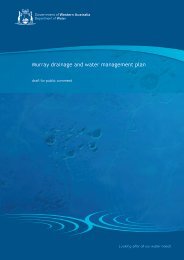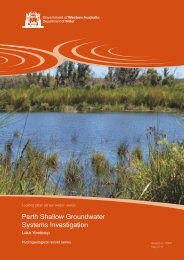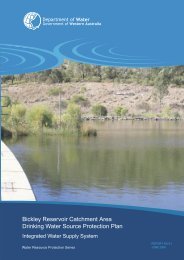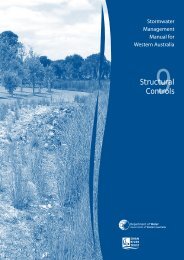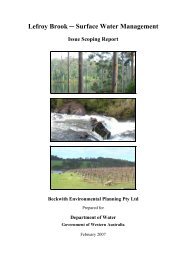Dealing with salinity in Wheatbelt Valleys - Department of Water
Dealing with salinity in Wheatbelt Valleys - Department of Water
Dealing with salinity in Wheatbelt Valleys - Department of Water
Create successful ePaper yourself
Turn your PDF publications into a flip-book with our unique Google optimized e-Paper software.
Morrell, Hatton and Curry<br />
Another three severe frosts repeated the devastation<br />
<strong>of</strong> 1998, <strong>with</strong> losses <strong>of</strong> up to 80% <strong>of</strong> potential yields<br />
lost. In 2000, drought reduced yields to an even<br />
lower level than the previous two frosts.<br />
As a result <strong>of</strong> the three years <strong>of</strong> greatly reduced<br />
<strong>in</strong>come, the average loss <strong>of</strong> equity was <strong>in</strong> the order<br />
<strong>of</strong> 10% per year, leav<strong>in</strong>g the community <strong>in</strong> a very<br />
vulnerable position. The whole <strong>of</strong> the catchment<br />
falls <strong>with</strong><strong>in</strong> the declared Exceptional Circumstances<br />
area.<br />
2001 is shap<strong>in</strong>g up to be the driest on record.<br />
Currently, at the time <strong>of</strong> writ<strong>in</strong>g (early July) farmers<br />
are <strong>in</strong> one <strong>of</strong> the follow<strong>in</strong>g positions: (1) no crop <strong>in</strong><br />
the ground yet, (2) some or (3) all <strong>in</strong> the ground. It<br />
depends entirely on tillage methods as to the amount<br />
<strong>of</strong> seed<strong>in</strong>g completed. No tillage or m<strong>in</strong>imum tillage<br />
farmers have either all or some <strong>in</strong>, while traditional<br />
croppers have either some or none <strong>in</strong>. Some crops<br />
have emerged, <strong>with</strong> many now dy<strong>in</strong>g; some seed has<br />
malted <strong>in</strong> the ground, while much seed has not<br />
germ<strong>in</strong>ated due to the extremely dry conditions.<br />
Much <strong>of</strong> the area is totally reliant on ra<strong>in</strong>fall for all<br />
water requirements, and many landholders have<br />
been cart<strong>in</strong>g both house and stock water from <strong>of</strong>f<br />
farm sources for many months. The worst affected<br />
areas for lack<strong>in</strong>g water also co<strong>in</strong>cide <strong>with</strong> the areas<br />
<strong>with</strong> the most <strong>sal<strong>in</strong>ity</strong>.<br />
With a total community population <strong>of</strong> approximately<br />
200, a loss <strong>of</strong> even one family is felt. In the last year<br />
and a half, eight families have left the district, <strong>with</strong><br />
three more leav<strong>in</strong>g at the end <strong>of</strong> the school year. It<br />
has meant a net loss <strong>of</strong> 23 to our community <strong>with</strong> a<br />
further sixteen leav<strong>in</strong>g later <strong>in</strong> the year. If the dry<br />
conditions cont<strong>in</strong>ue, and another crop failure occurs,<br />
many more families will be forced to either sell up,<br />
or move <strong>of</strong>f their properties.<br />
Without a vibrant, stable community, implementation<br />
<strong>of</strong> the Catchment Plan and other landcare works will<br />
cease. In other words, if there is no community, no<br />
one will be left to address the <strong>sal<strong>in</strong>ity</strong> issues.<br />
Without any implementation <strong>of</strong> the Catchment Plan<br />
and other landcare works, much <strong>of</strong> the land that is<br />
not affected by <strong>sal<strong>in</strong>ity</strong> yet will be lost to production<br />
<strong>of</strong> cereal crops and traditional farm<strong>in</strong>g, as we know<br />
it.<br />
Not only will the traditional farm<strong>in</strong>g land be lost to<br />
<strong>sal<strong>in</strong>ity</strong>, but large areas <strong>of</strong> the rema<strong>in</strong><strong>in</strong>g remnants<br />
will also be lost. Current predictions show that if<br />
there are no changes to current agricultural<br />
– 6 –<br />
practices, then more than 80% <strong>of</strong> remnants on farms<br />
are <strong>in</strong> danger as are more than 50% <strong>of</strong> those <strong>in</strong><br />
Reserves, either Conservation Commission, Crown<br />
Land or Shire controlled.<br />
It is vital therefore to keep our community as a<br />
function<strong>in</strong>g, vibrant concern, because <strong>with</strong>out the<br />
community <strong>in</strong> place there is very little chance <strong>of</strong><br />
tackl<strong>in</strong>g the decl<strong>in</strong><strong>in</strong>g biodiversity issues that face the<br />
region. Without people, there will be no fight to<br />
control <strong>sal<strong>in</strong>ity</strong>. Communities such as P<strong>in</strong>grup will<br />
only survive to tackle these issues if they are able to<br />
be pr<strong>of</strong>itable. Without be<strong>in</strong>g able to make a liv<strong>in</strong>g<br />
from farm<strong>in</strong>g or its associated <strong>in</strong>dustries, there will<br />
be no money available to do landcare work for the<br />
public’s benefit. It is therefore <strong>in</strong> everyone’s <strong>in</strong>terest<br />
to ensure that communities like P<strong>in</strong>grup survive.<br />
It is vital that we realise that <strong>with</strong>out people, no<br />
amount <strong>of</strong> new technology will be effective, as there<br />
will be no one left <strong>in</strong> rural areas to enact these new<br />
ways. Community survival should, therefore, be<br />
uppermost <strong>in</strong> the m<strong>in</strong>ds <strong>of</strong> our decision makers.<br />
Terms <strong>of</strong> trade are not favourable for Australian<br />
farmers. We seem to be the only country play<strong>in</strong>g on<br />
the "level play<strong>in</strong>g field". Our major competitors are<br />
heavily subsidised by their governments, while we<br />
are not. This has made Australian farmers the most<br />
efficient <strong>in</strong> the world, but doesn't help us to survive,<br />
as the returns for our commodities barely cover the<br />
costs <strong>of</strong> production. M<strong>in</strong>or weather events, or<br />
events occurr<strong>in</strong>g somewhere <strong>in</strong> the world, threaten<br />
our viability. With major weather caused events,<br />
such has occurred <strong>in</strong> the last three years, and<br />
seem<strong>in</strong>gly cont<strong>in</strong>u<strong>in</strong>g this year, very few farmers are<br />
able to make a pr<strong>of</strong>it. This causes an exodus <strong>of</strong><br />
families at the very worst, or a change to "survival<br />
mode" by the rema<strong>in</strong><strong>in</strong>g farmers. Very little can be<br />
done <strong>in</strong> the landcare area, as all money is required to<br />
try to ensure survival <strong>in</strong> the short term, rather than<br />
look<strong>in</strong>g after the environment on farmers own land,<br />
let alone that <strong>of</strong>f farm.<br />
Unfortunately, P<strong>in</strong>grup is not unique <strong>in</strong> this regard. This<br />
situation is repeated right across the <strong>Wheatbelt</strong>.<br />
THE DILEMMA: WHAT TO DO ABOUT IT?<br />
Currently two thirds <strong>of</strong> farm<strong>in</strong>g families have some<br />
<strong>sal<strong>in</strong>ity</strong> on their properties. These range from a few<br />
hectares to an enormous 30% <strong>of</strong> previously arable<br />
cereal land now be<strong>in</strong>g non-productive. Twelve<br />
percent <strong>of</strong> the catchment is currently affected. This<br />
may seem a small amount, but when it is your farm<br />
that is affected, it can have major ramifications.


